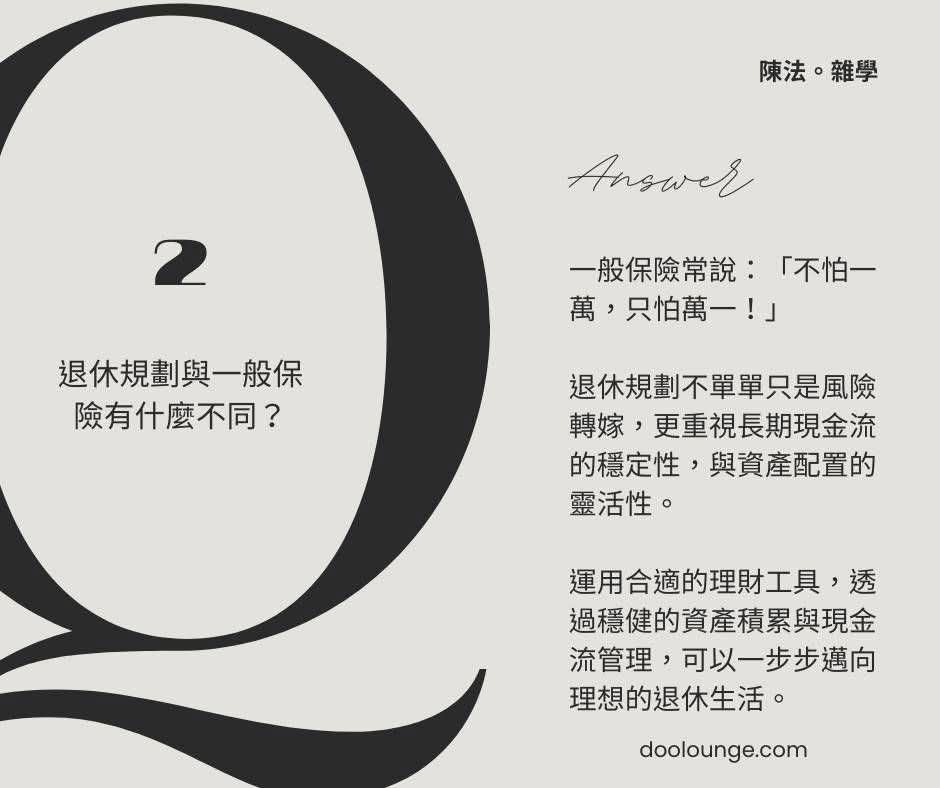
Q2:退休規劃與一般保險有什麼不同?
A:一般保險常說:「不怕一萬,只怕萬一!」
退休規劃不單單只是風險轉嫁,更重視長期現金流的穩定性,與資產配置的靈活性。
運用合適的理財工具,透過穩健的資產積累與現金流管理,可以一步步邁向理想的退休生活。

Q1: Can insurance really help plan for retirement? A: Life insurance, annuity insurance, participating policies, investment-type insurance products, etc. can help create a stable cash flow, risk transfer and tax optimization. As long as you follow your personal risk assessment, discuss with professional risk control managers, and make good use of different tool combinations, you can easily achieve retirement planning.

Q3: Why is my hair frizzy? A: Common reasons include excessive dyeing, UV exposure, and lack of moisturizing. As we all know, you can use hair oil and repair conditioner to improve the condition. In fact, hair damage is not just what you know. The most common and often overlooked reason is the temperature of the hair dryer. Common hair dryers do not have a constant temperature function, so the longer you blow, the higher the temperature, causing excessive damage to your hair when you blow dry it every day.

Q2: What is the difference between conditioner and hair mask? A: It is mainly because of the difference in the molecular size of the two components. Conditioner has larger molecules and only smoothes the surface. Hair mask has smaller molecules and can penetrate deep into the hair core for repair. It is recommended to use it 1-2 times a week. If economic conditions permit, daily care can be directly replaced with hair mask with smaller molecules. The hair quality will be better than going to the hair salon for hair care.

Q1: Will washing your hair every day damage your scalp? A: Not necessarily, it depends on the condition of your scalp. Oily scalps can be washed every day, while dry or sensitive scalps are recommended to be washed every 2-3 days. The key points are whether the pH value of your shampoo is too high and whether you blow dry your scalp immediately after washing your hair.

When you see that the ETF has a stable annual return of 6%, don't rush to open leverage and rush into the market! After deducting the handling fee, interest tax and inflation, the actual amount in your pocket may be less than 5%. If you still use credit investment, the interest rate spread is meager and the risk is doubled, which will make you become a leek swallowed by inflation. It is recommended for beginners to use spare money and make a long-term and stable layout.

Many people say they hate insurance, but what they hate is not insurance, but the feeling of powerlessness in the face of risk itself. Risks are everywhere, so instead of taking them on yourself, it is better to transfer them. Insurance is the most practical risk transfer tool. I don’t force anyone to buy insurance, but you should at least think seriously: when risks come, have you thought about how to deal with them?

Many people mistakenly believe that investment-type insurance policies are very risky. In fact, their risks can be freely adjusted according to personal attributes, and they also have protection functions. With a stable target and a long-term holding strategy, you can not only accumulate assets, but also withdraw them flexibly and use them flexibly. With the help of a dedicated person to adjust, you can plan your life with more peace of mind.

Most people cannot save money because of psychological barriers, including difficulty in delaying gratification, abstract goals, financial anxiety, etc., which make people feel that saving money is like continuous bleeding and despair. If you can design a system that "makes you happier the more you save money", such as giving yourself interest rewards regularly, you can make saving money easy and natural, and start the rich mode of making money from money.

The insurance industry often promotes "direct inheritance" as the best tax rate, but it may not be suitable for all situations. If there is a need for reinvestment, it is more advantageous to adopt the purchase and sale inheritance and make a high-value registration, especially for real estate in urban planning areas. The real asset allocation should consider the loan amount, tax burden and future cash flexibility. It cannot only rely on SOP, but should start from the overall situation of the customer and plan the best solution.












